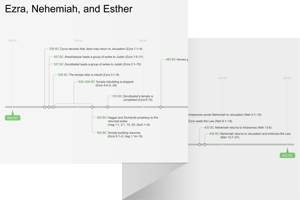9:1–10:44 The main topic addressed in the rest of the book of Ezra is the issue of intermarriage. The community of returned exiles has intermarried with the local population. Deuteronomy 7:1–6 prohibited intermarriage with the seven nations who lived in Canaan prior to the conquest. |
9:1 these Refers to delivering the king’s edicts to his officials (see Ezra 8:36). Several months have passed since the company arrived in Jerusalem; it is now the ninth month (see 10:9).
officials This Hebrew term can mean “official” or “prince.” They were probably the family leaders of the descendants of the Jewish remnant that originally returned under Sheshbazzar.
the people of the lands A representative list, reminiscent of several similar lists in the Pentateuch (compare Gen 15:19–21; Exod 23:23; 33:2; Deut 7:1–6; 20:17). The Ammonites and Moabites may have been added to this list based on Deut 23:3–6 (see note on Ezra 9:1–10:44). The Canaanites, Hittites, Perizzites, Jebusites, and Amorites are each identified as one of the seven nations in the promised land that are greater and stronger than Israel (Deut 7:1).
Canaanites Descendants of Canaan, the son of Ham. The Canaanites lived along the eastern Mediterranean coastal regions from Egypt to Lebanon (Num 13:29).
lived along the eastern Mediterranean coastal regions from Egypt to Lebanon (Num 13:29).
Hittites A tribe descended from Heth, the son of Canaan. See note on 1 Kgs 10:29.
Perizzites A people group that first appears in Gen 13:7, where they are identified as dwelling in the land of Canaan at the time of Abraham (Gen 34:10).
Jebusites A tribe descended from Canaan, the son of Ham (Gen 10:16). The Jebusites lived in the hill country (Num 13:29) and were the original inhabitants of Jerusalem.
lived in the hill country (Num 13:29) and were the original inhabitants of Jerusalem.
Ammonites A tribe descended from Ben-ammi, the son of Abraham’s nephew Lot. See note on 1 Chr 19:1.
Moabites A tribe descended from Moab, the son of Abraham’s nephew Lot. See note on 2 Kgs 3:4.
Egyptians See note on Isa 19:1.
Amorites A tribe descended from Canaan, the son of Ham (Gen 10:16). The Amorites lived to the west of Mesopotamia and thus were called “westerners.”
lived to the west of Mesopotamia and thus were called “westerners.”
9:2 from their daughters The issue at stake is religious, not ethnic. Jewish men had married foreign women and made the mistake of adopting their wives’ gods (Mal 2:10–16). This opposed God’s desire to be worshiped exclusively and threatened the survival of the nation.
the holy seed The Hebrew phrase used here, zera' haqqodesh (“the holy seed”), echoes the sentiment of Deut 7:6 (am qodesh; “holy people”) that identifies Israel as a people set apart for Yahweh. The phrase is also likely an allusion to Isa 6:13 where the zera' qodesh (“holy seed”) refers to the remnant of Jewish people restored to the land after judgment.
has mixed itself The use here of the Hebrew verb arav (“mix”) may be alluding to Psa 106:34–36, which describes how mixing with the nations led Israel into idolatry. The law against mixing things of different types in Lev 19:19 may also have influenced the conception of intermarriage as unfaithfulness.
9:3 When I heard this The meeting of elders described in Ezra 10:9 took place more than four months after Ezra’s initial arrival. He may have been away from Jerusalem for those months delivering the king’s edicts to the Persian officials of the province (see 8:36 and note).
I tore my garment and my robe A common mourning ritual in the ancient Near East (see Gen 37:29, 34; 44:13; Num 14:6; Josh 7:6; Judg 11:35). Ezra tears both his undergarment and outer garment.
9:4 all who trembled Refers to those among the Jewish community who were attempting to live according to God’s law.
the evening offering Offered at twilight (Exod 29:41). The scribe had probably taken a seat near the temple (see Ezra 9:5; 10:6)—a public place—where the people could see his grief.
9:5 I spread out my palms Describes a common position for prayer (compare Dan 6:10; 1 Kgs 18:42; Psa 88:9; Isa 1:15; perhaps Lam 1:17). Solomon assumed this same position when he offered his prayer of dedication for the temple (1 Kgs 8:54; 2 Chr 6:13).
9:7 the kings of the lands Refers to the kings of Assyria and Babylon.
9:8 a brief moment Refers to the 80 years from Cyrus’ decree to the present time (538–458 bc).
a remnant The Hebrew term for “remnant” means “survivor” (compare Gen 45:7; Isa 4:2; Ezek 14:22). Ezra uses the term four times in his prayer to refer to the community of those who returned from exile (Ezra 9:8, 13, 14, 15; compare Neh 1:2).
security This Hebrew term refers to a tent peg or stake. Just as the erecting of a tent begins with a stake driven into the ground, the rebuilding of the nation of Israel is begun with the escaped remnant serving as the initial foothold.
his holy place Refers to the land of Judah as a whole and perhaps Jerusalem in particular.
to brighten our eyes Refers to the immediate sense of physical revival that nourishment can bring following a period of hunger and thirst (1 Sam 14:27, 29).
9:11 the prophets Refers to Moses (Deut 7).
9:15 can stand The Hebrew term used here is a legal term meaning “to be acquitted” (Pss 1:5; 130:3). None are regarded as guiltless before Yahweh.

|
About Faithlife Study BibleFaithlife Study Bible (FSB) is your guide to the ancient world of the Old and New Testaments, with study notes and articles that draw from a wide range of academic research. FSB helps you learn how to think about interpretation methods and issues so that you can gain a deeper understanding of the text. |
| Copyright |
Copyright 2012 Logos Bible Software. |
| Support Info | fsb |
 Loading…
Loading…


